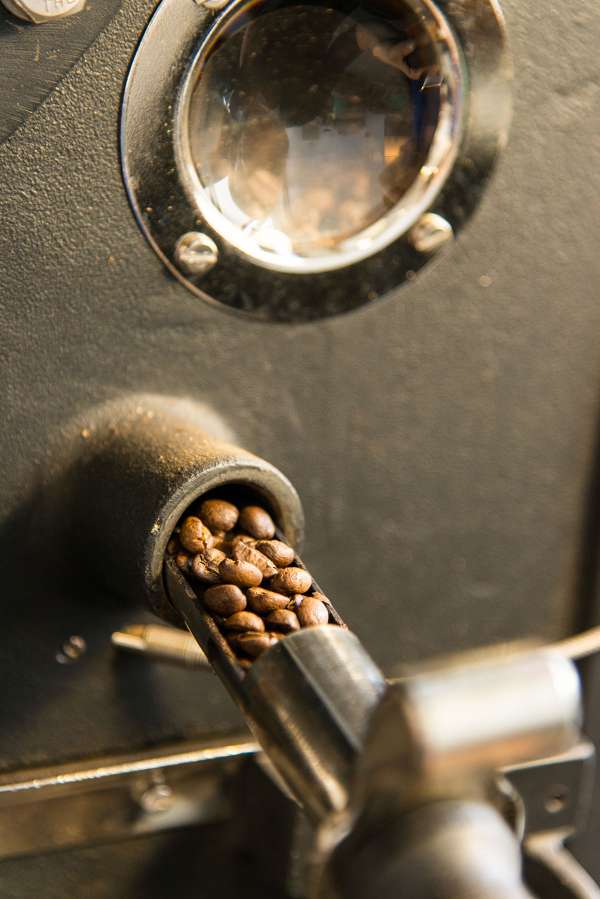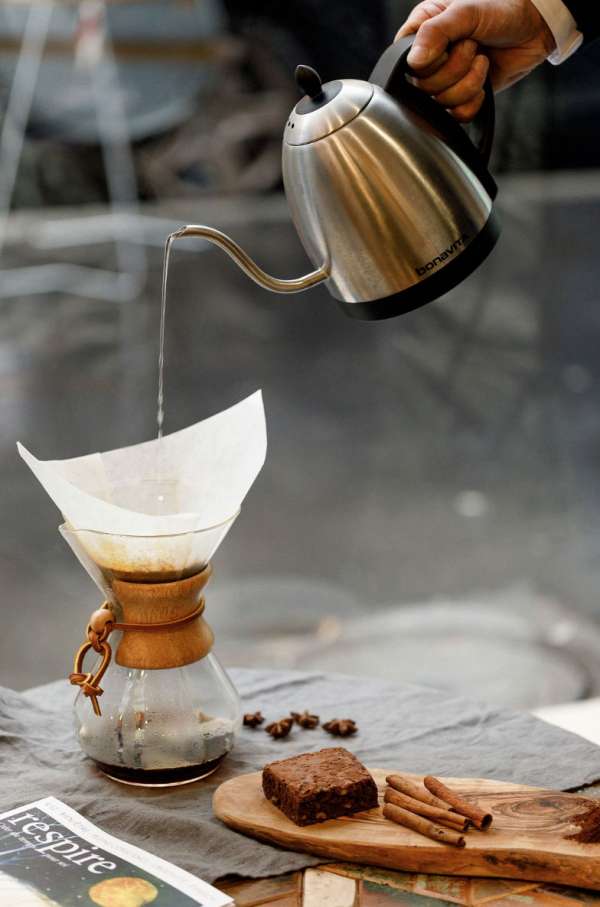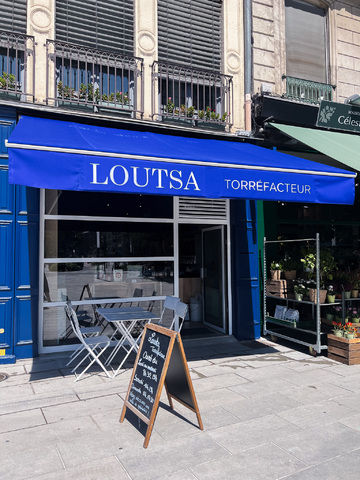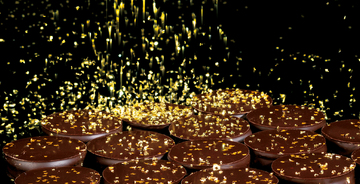Lyon’s growing passion for coffee

With more singular notes, specialty coffees, which are roasted using artisanal methods, using beans that are carefully sourced from small-scale producers, have won over the hearts and cups of the people of Lyon in the space of just a few years.
We investigated.
From the street, the smells of coffee tantalise the taste buds of passers-by. Inside the shop stands an imposing red machine. The green beans, sourced directly from Ethiopia, are poured into the tank, the beans dry for a few moments and are then cooked at more than 200°C. The aromas gradually develop until the beans crack open. The roasting is complete and the little beans come out slightly caremelised and ready to use.
This roasting process, which is a little bit noisy, was once hidden from customers’ eyes and ears. Today, with transparency and authenticity in mind, it is put proudly on show at places like Loutsa and Torréfaction Papillons.
The pionneers
At their tiny coffee shop on Rue des Capucins, at the bottom of the slopes of Croix-Rousse Hill, Sadry Abidi and his wife, Rosamund Morris James, creators of Mokxa, were the first in Lyon to offer specialty coffees. This was back in 2011. In their micro coffee shop, they roasted their own coffees, for customers to enjoy indoors (only 12 seats) or on the terrace. It was an immediate hit. People flocked there to drink their hugely popular beverages.
Little by little, the coffee shop grew, offering bagged coffee to take away, and began to work as a supplier for restaurants and bars. They never looked back.
Today, forty or so businesses, scattered around Lyon, have mastered the artisinal method of making coffee, including Gonéo, Bongoo Café, Rakwé, Label(le) Brûlerie and Loutsa. All of these places offer specialty coffees, which are high quality, noble coffees, with a complex aromatic profile, generally grade-1 arabica, grown at an altitude of more than 1200 metres. In order to stand out, coffee roasters place great importance in the origin of their beans, because coffee is a product of its terroir, drawing its aromas from the soil where it grows. Following the selection of beans, each individual coffee roaster’s expertise comes into play in the bean drying and roasting methods used. With a single coffee bean, it is possible to develop up to 1000 aromas!
To each their own coffee
With this in mind, Guillaume Langloy created Loutsa in 2018. His aim was to convince the people of Lyon that coffee is not just a “dark and bitter beverage.”
“In fact, there are more varieties of coffee than there are wine varieties”, explains this entrepreneur. You can find spicy, floral, fruity, woody and even naturally sweet coffee. It is the art of coffee roasters to bring out this palette of flavours. “ For now, he offers a dozen or so varieties. As do Mokxa and Gonéo. At Voisin, there is a selection of 25 coffees. “Each has its own personality and the idea is to have the widest range possible, so we can cater to all tastes,” explain Romain and Franck Boucaud.
“Generally speaking, coffees in Lyon are very different to Italian coffees,” adds Guillaume Langloy. Their speciality is to burn the beans to produce very bitter coffees. Here, we tend to look for fruity and slightly acid notes.”
In order to preserve as much of their flavours as possible, beans must be sold within two months of their roasting. With coffee sold by large retailers, it’s more like two years. The taste of coffee is then shaped by the method used to extract it: filter or espresso.
“Coffee is vastly superior when it is ground just before serving,” stress Romain and Franck Boucaud.
It is a little known fact that a coffee’s colour and taste will vary depending on whether it is served in a glass or porcelain cup. The choice of vessel, therefore, also plays an important role.
The return of the responsible consumer
While coffee has regained its former splendour of late, it is not reserved for an elite.
In shops and coffee shops, customers from various backgrounds rub shoulders as they seek advice from true “coffee sommeliers”.
Many “java drinkers” (re)discovered coffee during the lockdowns. “There was huge growth in sales during that period,” the coffee roasters all agree. The establishment Voisin sees that period as a “meeting point with a new clientele. There was a strong desire to return to local businesses, artisanal methods and premium products that have a story and real traceability. People are no longer satisfied with a standard product. So, our coffee, which has been made in Lyon since 1897, won over responsible consumers.”
Coffee roasters have become the new neighbourhood wine merchants, so to speak. Elsewhere, growth in the popularity of bean-to-cup coffee machines has also boosted sales, while some aficionados have even returned to the good old coffee grinder! “It’s kind of fun and it has even become a ritual for some people to grind their coffee before making it,” explains Guillaume Langloy. This trend is also picking up pace in companies. Coffee machines with plastic cups are on their way out. Bean-to-cup machines that use local products, however, are all the rage. “Demand is growing all the time,” says Voisin, one of Lyon’s historical coffee roasters: “The coffee machine plays a very important role and offering a premium product, roasted locally, is part of the new values promoted by companies.”
Working hand in hand with restaurants
The people of Lyon’s thirst for coffee is such that Loutsa sells a ton of coffee each week, while Voisin sells 150 tons a year. This popularity can also be seen in restaurants, where the coffee brand is now featured on menus.
Claude Barbet, of Vourles, for example, offers a tailor-made coffee that is roasted specifically for his restaurant by Loutsa.
Increasing professionalization
With a growing passion for coffee among consumers, a new profession has emerged: baristas.
Like mixologists in the world of cocktails, baristas are specialised in the preparation of coffee-based drinks, such as cappuccino, latte macchiato and moccaccino, and new coffee preparation techniques have appeared.
There is the Chemex, for instance, a filter coffee maker made of glass in the shape of an hourglass, which enables the use of a slow-filtering method.
Then there is the cold brew recipe, a cold infusion method for ground coffee that takes several hours to extract all of the flavours. They all offer new ways to delight the palates of Lyon’s coffee drinkers.
Three questions to Hélène Le Corre
Co-founder of the coffee roasting workshop Label(le) Brûlerie in Villeurbanne
How did you get involved in coffee?
We are four women and each of our stories is a little bit different.
As for me, I worked in international relations and I travelled to coffee-producing countries fairly regularly.
What interested all of us was the supply chain side of it. We wanted to have total control and traceability from the tree to the cup, with a responsible sourcing approach. We’re a member of Roasters United, an international coffee roasters cooperative. We operate similarly to an Amap (Translator’s Note: a French association based on an alternative business model bringing together consumers directly with farmers) by purchasing as a group from a dozen cooperatives, while respecting the principles of fair trade.
We go out into the field, get to know our producers and build close relationships with them.
How would you describe Lyon’s coffee scene?
It’s very lively! The market is growing fast. People want to know what they’re consuming, they want to return to artisanal methods and they’re ready to spend a bit more to get quality products.
Many new stakeholders will continue to arrive in the coming years and not just in the area of organic coffee.
Most people still buy their coffee in supermarkets, so there’s still a lot of work to do!
Which places would you recommend for a tasty cup of coffee?
In Villeurbanne, there’s Folks, a really nice little coffee shop near the town hall.
I would also mention Okara on Place Jules-Guesde in Lyon’s 7th district. It’s run by a realy nice group of girls, with a great little menu and beautifully served coffee
To find out more:
For a roasting introduction workshop on Wednesdays only, make an appointment at wecandoo.fr.
Family coffee
At the Calleghers, coffee it a family story.
In 1987, Patrick was one of the first roasters to move to Lyon, in the Croix-Rousse district. At the time, the profession of coffee roaster remained fairly uncommon. His three children, Gaël, Audrey and Maureen, took over the reins and now carefully look after the establishment’s historical recipes.
Visits possible on request.
From €3.70 to 9.90 for a 250 g packet €5.50 for organic coffee..
Coffee by women
In her workshop and store in Vaise, Charlotte Robert roasts specialty coffees that have the peculiarity of being produced only by women. She also offers a range of forty or so teas and herbal teas. And chocolates.
From €8.50 for 250 g.
Coffee and work
At Rakwé, a coffee shop and coworking space, Élias Sfeir did not see himself serving anything other than specialty coffee roasted personally. Since 2017, he has worked with producers from around the world to develop new extraction processes.
At the moment, he is working on a Colombian coffee with carbonic maceration, which is inspired by a winemaking technique.
His favourite brew? A coffee with green cardamom, as is traditional in Lebanon.




